Veganuary was never been so hot as in 2019. With the number of vegans in the UK rocketing to 3.5 million in 2018 (and a 600% increase in USA veganism in the last three years). It seems plant-based living is set to stick around – and not just in the kitchen. Vegan luxury has been tipped by The Telegraph as one of 2019’s key trends. Designers including Stella McCartney and trainer brand, Veja are spearheading the shift, whilst London Fashion Week, Burberry, Versace, Gucci and Hugo Boss have all announced they’re eliminating fur from their lines.
But a truly vegan luxury garment is about much more than avoiding fur and leather. That’s according to Jake Allen, co-founder of London-based tailoring outfitters, King & Allen, whose PETA-endorsed vegan tailoring services were attracting attention with their clientele long before veganism officially became a “thing”. To achieve a genuinely vegan garment, attention to detail is the watchword, starting from the inside out.
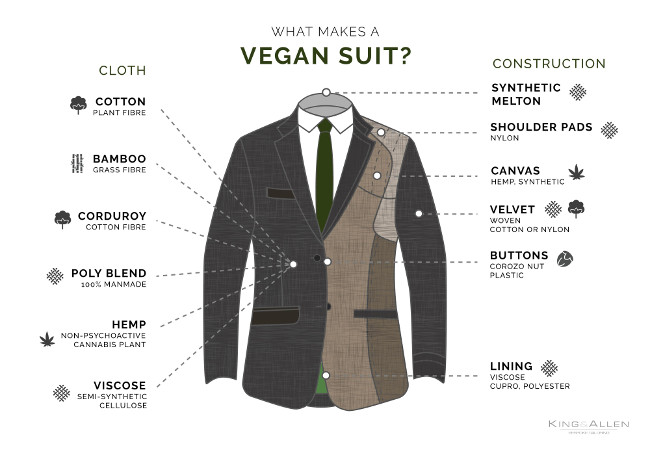
“There are numerous elements of a traditionally tailored suit that might not fit with vegan principles,” Jake says. “A tailored suit is intricately constructed, and many of the components that tailors normally choose are animal derived products – even the ones you can’t see. It’s not just about the choice of fabric, it’s also about the lining, the collar, the thread, the buttons and trims – even the separate accessories such as ties or handkerchiefs.
“Many people don’t realise, for example, that a lot of velvet fabrics are spun from silk – which of course comes from silkworms. Horsehair canvas is a conventional choice for constructing the suit’s innards such as the collar lining. Horn and mother of pearl are popular choices for buttons, but for a strict vegan they’re a no-no. Plus, our vegan clients are often equally as concerned with their carbon footprint as with their product consumption.”
Do your homework, though, and there’s no reason that a fully tailored suit can’t be crafted to vegan principles. Here’s Jake’s insider tips on the key areas to discuss with your tailor for a totally vegan, totally luxe look.
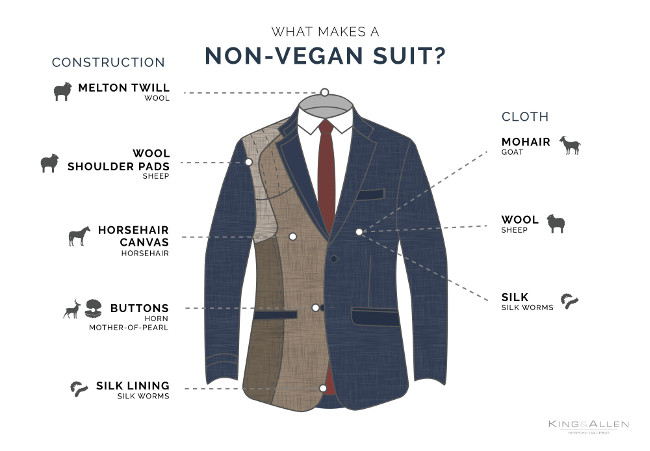
Jake’s Insider Tips on Luxury Vegan Tailoring:
The Fabrics – What to Choose:
Bamboo:
For me, bamboo is the revolutionary fabric of the moment. The weaves that we source from Italy achieve the breathability of natural fibre whilst imitating the comfort and hang of a soft wool – a combination that lends itself extremely well to vegan tailoring.
Hemp:
If you’re concerned about the environment, hemp is sustainable, low impact and biodegradable. Tailoring with hemp is still in relative infancy, however we’re currently collaborating with the Hemp Society to achieve the best fabric performance for formal garments.
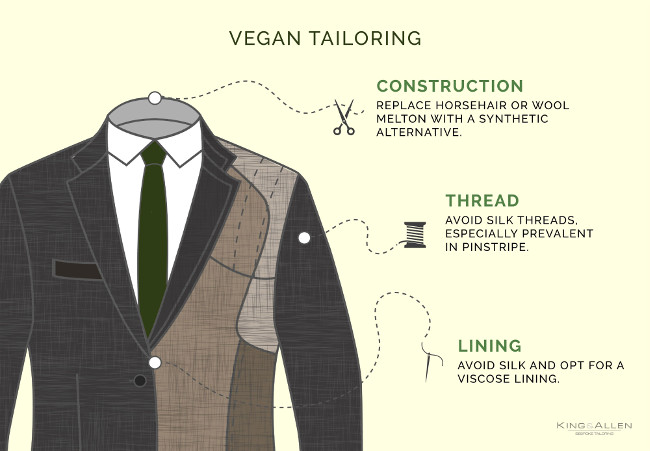
Poly Blend:
Poly blends provide durability, easy wear and excellent hang, plus they’re budget friendly. If you’re looking for an entry-level vegan suit, then a poly blend fabric is a great place to start.
Cotton and Linen: These are amazingly breathable and create a relaxed, elegant look. However, creasing can be an issue, so talk to your tailor about care and maintenance.
The Tailoring – What to Look Out For:
Construction:
Check for the presence of horsehair, which is used to create body and shape in the chest area. Horsehair can be replaced with a synthetic alternative. Similarly, wool melton, which is used to stiffen the collar, can be replaced with another layer of cloth or lining to make it vegan.
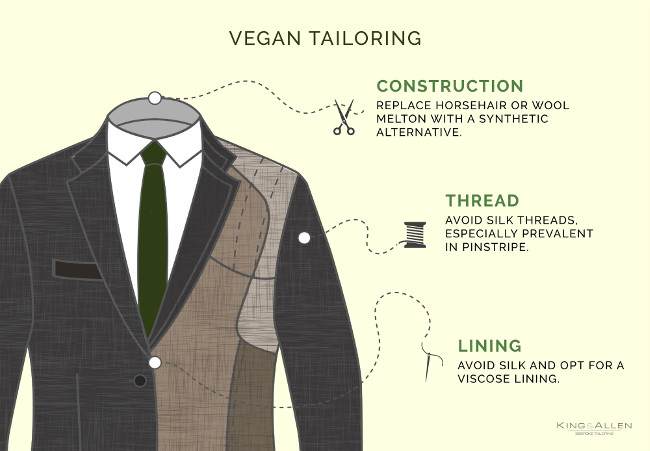
Lining:
Silk should be avoided, instead opt for a viscose lining. Don’t forget that the right lining can add a fabulous statement to a suit, and synthetic options offer a great choice of colours and finishes to achieve that accent.
Thread:
Check that your suit does not incorporate silk thread – especially if you are choosing a pinstripe, which is often woven into the fabric from silk thread. A cotton or synthetically constructed thread is a suitable alternative.
The Trims – What You May Not have Thought Of:
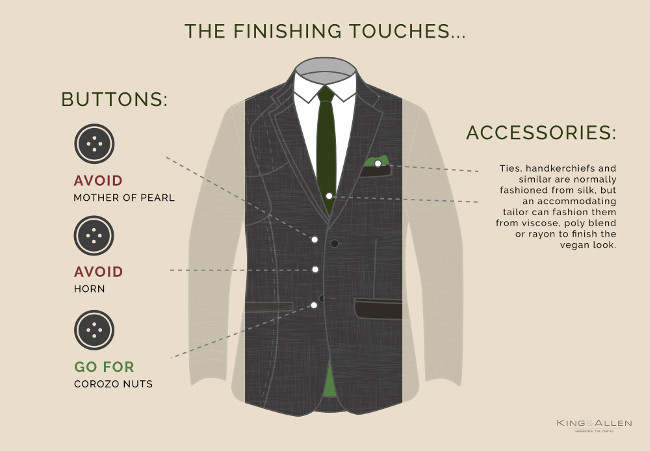
Buttons:
Horn and mother of pearl are both typical go-tos for conventional suit construction. The Corozo nut is a brilliant alternative – it’s a 100% natural and sustainable product that is extremely hardwearing, as well as offering an attractive grain and range of colours.
Accessories:
Ties, handkerchiefs, scarves and similar are normally fashioned from silk. A good alternative is to have your accessories made up by your tailor in a synthetic fabric to match your suit, such as viscose, poly blend or rayon. Synthetic choices are available off the peg as well – but watch out for fabric blends and make sure you know what’s really in there.

Jake’s Top Tips for Sourcing your Vegan Suit
Define your parameters:
Are you purely interested in whether your suit is vegan, or are you also motivated by sustainability factors such as carbon footprint? This will affect your choice of fabrics and materials. For example, some poly blends are produced via recycling these days, whereas others can command a heavy carbon footprint.
Clarify your wearing priorities:
If you are seeking a bespoke suit for occasional wear, then issues such as creasing (to which cotton and linen can be prone) may not be such a pressing factor. If you’re seeking a daywear or business suit, then a poly blend or bamboo fabric may provide a more durable and practical alternative.
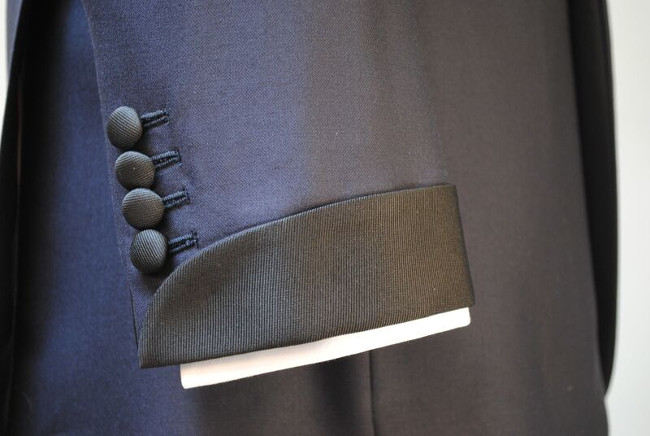
Look beyond the obvious:
Understand the construction components of your suit and what they are made of – from the lining to the thread, the fabric to the accessories. Don’t be afraid to ask your tailor about the specific components they are using – or, if buying off the peg, to research before you buy.
Think about your accessories:
Vegan shoes are relatively easy to find these days – however ties and other accessories are still often made from silk, especially in the bespoke market. Talk to your tailor about using a vegan fabric for these, or source synthetic alternatives if buying off the peg.
Please note: The image used at the very top of the article is for general illustration only and may not be representative of a fully vegan garment.






















